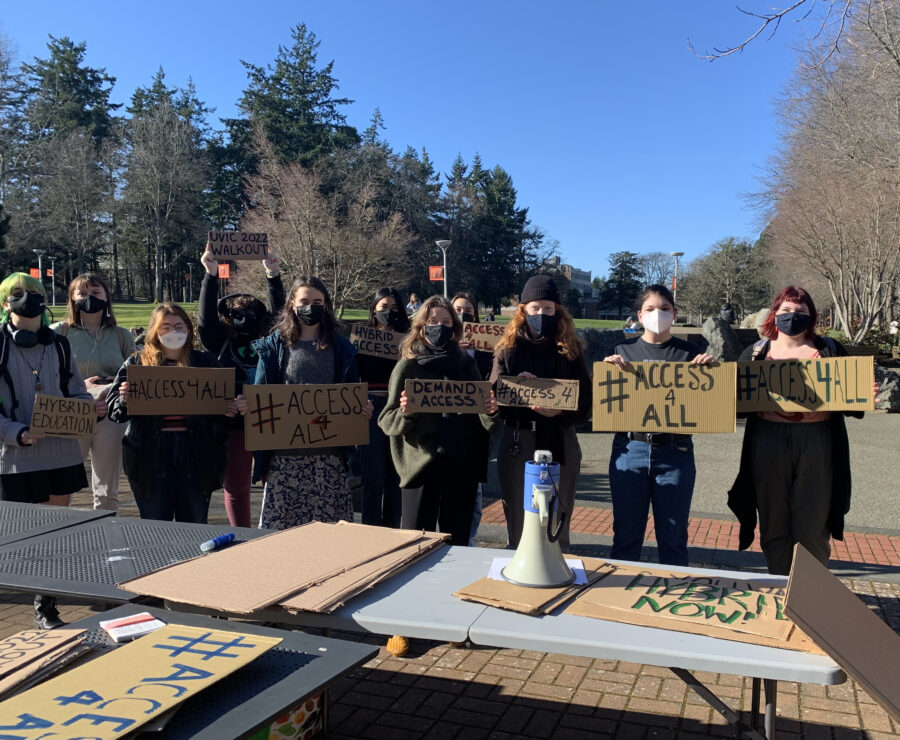Students gather in support of equitable access to education in light of the pandemic

On Feb. 16, over a dozen students gathered at Petch Fountain, holding signs with slogans such as “Hybrid Education,” “#Access4All,” and “UVic 2022 Walkout.”
The event was organized by UVic students Adrean Meuser and sky Dragushan to show support for equitable access to education in light of the ongoing pandemic. It was the first in a series of planned demonstrations that the two students hope will prompt changes at the university.
The idea for the initiative came after Meuser experienced extreme anxiety upon returning to in-person classes in January. “[It] was really challenging, and there weren’t any other options for me to navigate that situation,” Meuser recalls. They said they felt pressure to continue attending class in order to succeed, despite their discomfort.
“I really wanted to see if other people were feeling the same way as I was and if there was something the university could do to make everything a little bit easier for the folks returning [to] campus.”
Meuser then reached out to Dragushan, who also saw the importance of accessibility and hybrid learning options, and the two became a team.
Meuser and Dragushan have three demands for the university. The first is access to hybrid learning options for all classes, labs, and tutorials. While the pair is not against in-person learning, they are asking UVic to increase accessibility for students who can’t come to campus or don’t feel comfortable doing so.
“We are calling on the university to adequately compensate the professors and instructors so they are able to do this, because in a lot of cases they aren’t able,” said Dragushan. “They don’t have the technology. They don’t understand how to use the technology … They don’t understand the importance of the hybrid model.”
The university maintains that the proper educational tools are in place for professors to record lectures. However, the decision to use those tools lies with each individual professor.
“[UVic] encourge[s] instructors to record lectures if it makes sense to do so for their course,” said Acting Vice-Provost Susan Lewis in an email to the Martlet. “Over 90 per cent of bookable classrooms are currently outfitted with basic lecture capture technology. An instructor is best positioned to determine if lecture recording is appropriate.”
Lewis also stated that recordings are a tool to manage short-term absences rather than a replacement for in-person learning.
The second demand that the students are advocating for is that UVic works with the Society for Students with a Disability’s Access4All committee. The walkout is partnered with #Access4All, a campaign that aims to increase the accessibility of post-secondary learning by securing provincial funding for hybrid options.
The committee has been meeting with local representatives for the past 10 months and is seeking UVic’s support in advocating for the funding.
“Finally, we want to make sure that students are not being deducted marks for missing any classes due to illness, or self-isolation, or any other reason that students may be choosing to not attend school right now in-class,” said Meuser. “We want to make sure that students are not being penalized.”
According to Lewis, UVic has already waived the medical note requirement for absences related to COVID-19, and says students with medical conditions requiring accommodations should contact the Centre for Accessible Learning.
Lewis also noted that “limiting on-campus instruction has been associated with a significant negative toll for post-secondary students who reported much poorer and worsening mental health outcomes and greater negative impacts than other British Columbians when we were predominantly online.”
Meuser and Dragushan have created a survey designed to give students and professors a chance to share their opinions on in-person classes and the university’s COVID-19 protocols.
“We just want to hear the opinions of people who are engaged with this conversation and want to be able to work harder on moving forward so that we can have a more equitable educational opportunity in the future,” said Meuser.
They will be evaluating and adding to their demands based on the survey responses.
“We just want to be able to ensure that all students have access to classroom materials,” said Meuser. “It’s just really something that we need to work on moving forward into a post-pandemic world.”
So far, Meuser and Dragushan are happy with the responses they’ve received both at the in-person walkout and from the online survey. “We feel really strongly and really confident that there is a lot of support,” Dragushan said. “We are seeing a lot of support.”







